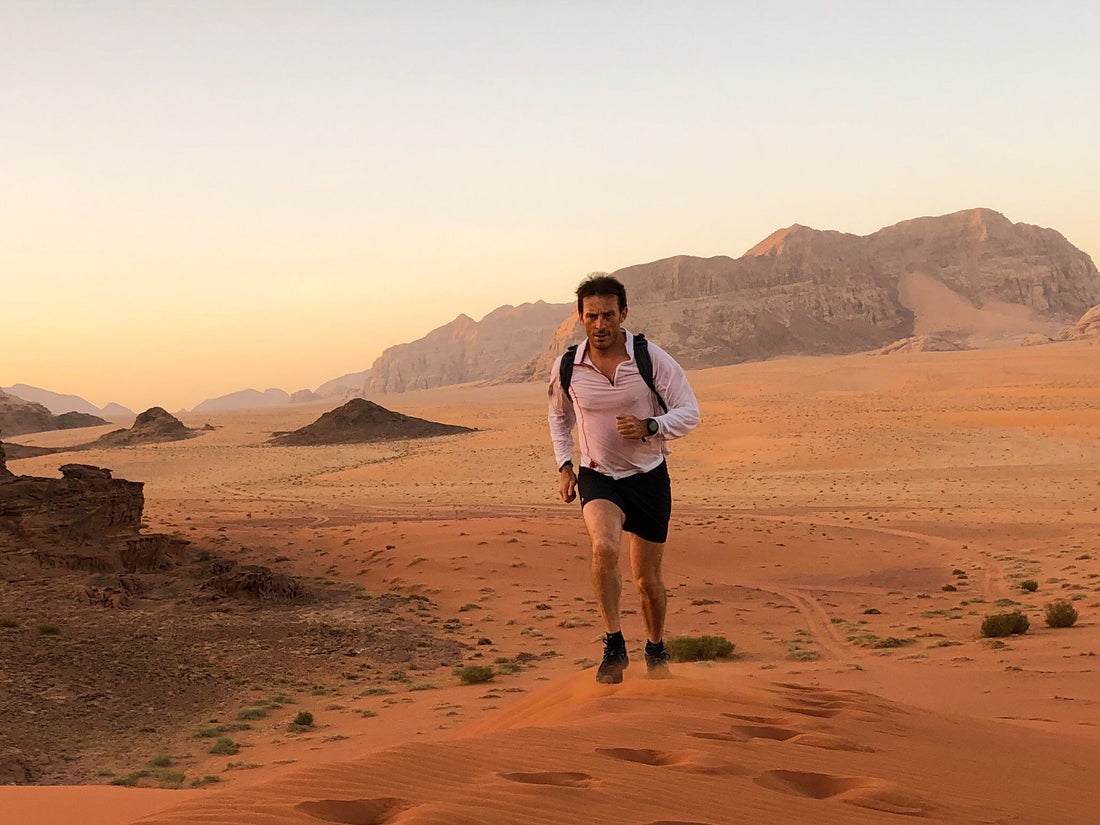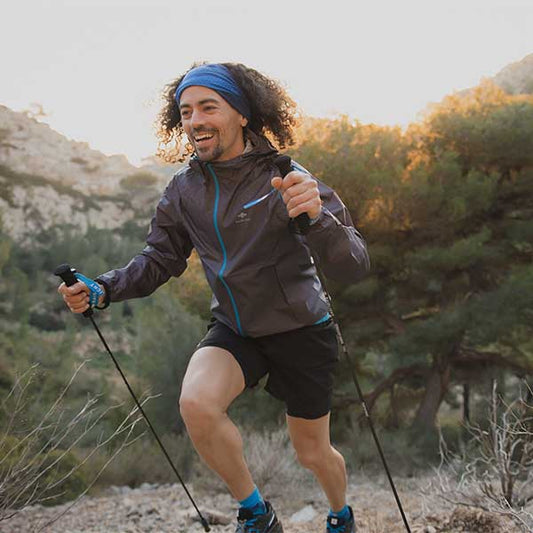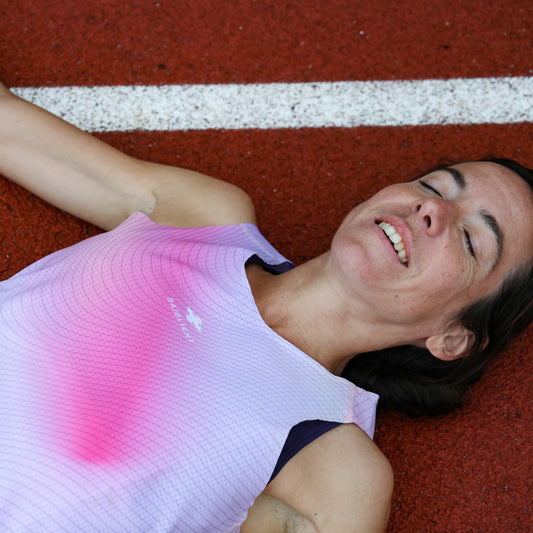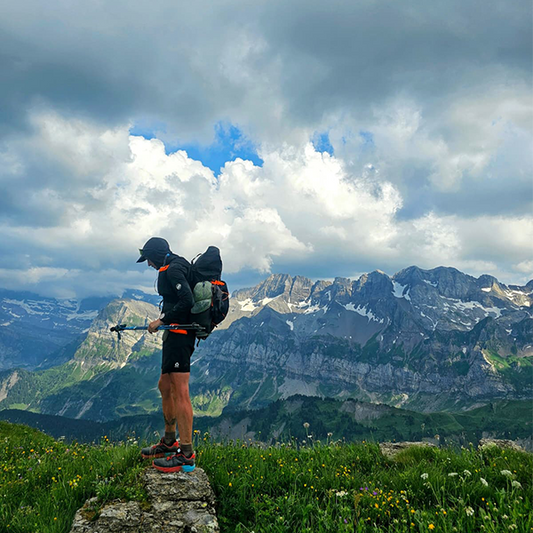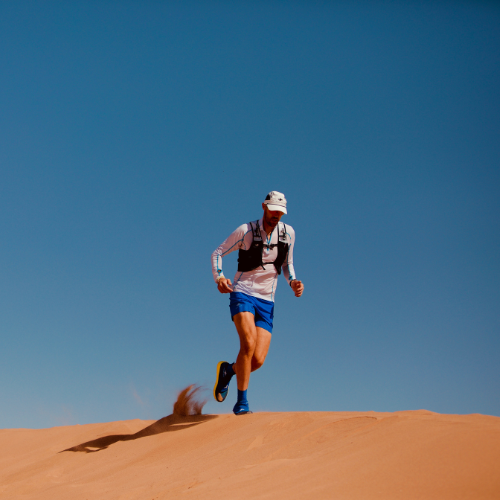Benoît Laval, a passionate trailer with an impressive list of achievements:
- More than 200 Trails in 32 countries and 65 victories
- Selected for the French Trail Team in 2010
- 2nd, 4th and 5th at the Grand Raid de la Réunion
- 5 Marathons des Sables
- 5th in the Ultratrail Gobi Race (400 km non-stop)
- 2 laps of the Barkley
- IOF World Orienteering Champion, French Snowshoeing Champion, French Trail Vice-Champion, French Orienteering Vice-Champion
- Winner of the Great Wall of China Marathon, the Barkley Fall Classic, the Annapurna Mandala Trail, 3 rounds of the French Trail Championships, etc...
Benoît is also an accomplished entrepreneur:
founder of the trail brand Raidlight and today of the travel agency NED - Trail To Be Alive, which offers stage races abroad. These are businesses linked to his passion, and they're all things he's invested in and thrived in from Saint-Pierre-de-Chartreuse.
Hello Benoît, your life seems to have been built around running, both personally, as shown by your track record, and professionally, with the Raidlight company you set up in 1999 and NED Trail to be Alive, which you took over in 2020. How did your passion for trail-running come about?
I started with athletics at the age of 10, my father was a runner and marathon runner, and I went to the club on Wednesday afternoons, then Wednesdays and Saturdays, then four times a week, the passion was born and we were a group of friends. I already liked it when it was more complicated and longer, like cross-country running and the 3,000 metres steeplechase. At the same time, I've always had a passion for the mountains, and I've been doing running courses in the mountains since the early 90s, and during the summer holidays when I was a student I ran across the Pyrenees in 1994, more than 600 kilometres in all, with a rucksack, a tent, a sleeping bag and just the bare essentials, on my own like that, at the time it was a bit wilder, no GPS, no smartphone, no Internet... Then I really started Trail running in 1998 with the Défi de l'Oisans, a 200-kilometre stage race, and the following year I took part in the Grand Raid de la Réunion, finishing 5th.
You have experience of a wide variety of race formats. Which one thrills you the most and why?
I've always loved discovering new things, new horizons and new sensations. I did my 1st marathon at the age of 19 with a 1,500-metre training run, I've run staircases like the Empire State Building and done ultratrails at the same time, I've tried the 100-kilometre road race, stage races, races in the desert, snowshoeing, orienteering?
I think that right from the start, I've liked it when it's in 'freedom' mode, with a big element of discovery and uncertainty. I'm often told about my experiences at the mysterious Barkley, a race that was extreme in its simplicity and so hard at the same time. My most enduring memory is of the Ultra Trail Gobi Race, 400 kilometres non-stop in the Gobi Desert in China, four and a half days heading towards the horizon straight into the wilderness with the minimum necessary in my rucksack.
Following all these experiences, what have you gained from this intensive practice of long-distance and very long-distance trail running?
I've turned all these experiences into jobs, which above and beyond jobs are above all my desire to occupy my neurons doing something that interests me.
First of all, taking part in product design at Raidlight, where I get an instant feel for whether a rucksack, jersey or accessory is going to be suitable for running. I feel this through all this experience in all these different conditions.
Then, I organise the NED - Trail to be Alive stage trails with the accumulated experience of over thirty stage races in my running life, all my accumulated travels, and my ability to read a map and landscapes. The organisation of these trips allows me to travel with a jigsaw puzzle to build during reconnaissance, to find interesting routes, and the organisation when the riders are there to share all this passion.
As you're an expert in long-distance trail running, we're going to make the most of it! What advice would you give to someone starting out in this discipline?
You have to follow your instincts, your desires and your dreams. If you want to do a long-distance ultratrail, it's no harder than doing a classic trail run or a marathon. There's no point in waiting 5 or 10 years. If you're already in good physical condition, my advice is to take the plunge, sign up and think it over afterwards!
In any case, all this is both superhuman and physically and mentally possible with a minimum of adequate preparation over a few months.
You have a professional career alongside your sporting career. How have you managed to do both?
I'd put the question the other way round. I've always spent more time working than running, in the classic way. I studied engineering, but I never stopped doing sport. I've always had a very demanding job, but I've never stopped running.
It's a choice about how you organise your time, because anyone can find the time to pursue a passion, whatever it may be. During the week, I generally take 3 times an hour to an hour and a half to do sport, and at the weekend it's easier to do more.
As far as organisation is concerned, I've always chosen to live near where I work, and near a nice place to go running in the countryside, like Saint-Pierre-de-Chartreuse for the last dozen years. This means I don't have to waste time on transport, time that I can put into sport.
And in terms of sports training, I've always favoured quality over quantity. That means shorter training sessions in terms of time and distance, but more intense in terms of rhythm and variability. This takes up less time in the schedule, while stimulating the body to all the intensities needed for competition, with less overall fatigue.
After several years of intensive practice, it's sometimes difficult to maintain a healthy and fulfilling relationship with your sport. What are your tips for avoiding boredom or obsession?
In my opinion, you have to vary your pleasures and always have new dreams and desires.
As well as running, it's often advisable to strengthen your muscles or do another complementary sport. What are your training habits?
We like to complicate things. But running is easy because you can do it anywhere, anytime, with very little equipment. For this reason, and given my schedule, I've mainly always run.
To conclude this discussion, and because we're curious, we'd like to know what your next goals are and which race number you're secretly dreaming of?
Since taking over NED Trail to be Alive in 2020, I've been spending a lot of time organising races, and I'm doing a lot of running in reconnaissance of these new destinations. There's no race number for me, but I'm mentally projecting myself as a competitive athlete.
In terms of race numbers, I'm now more focused on big adventures, the Himal Race for example (1,000 kilometres per stage in Nepal), or I'm also looking at the Badwater. I'm also looking at doing an adventure of several hundred kilometres alone in a desert...


